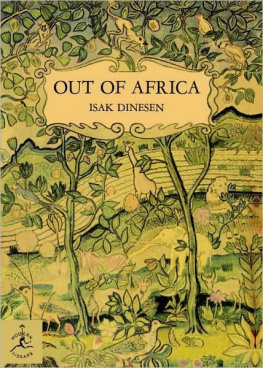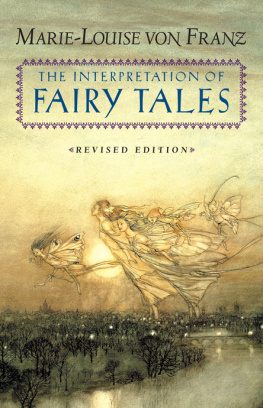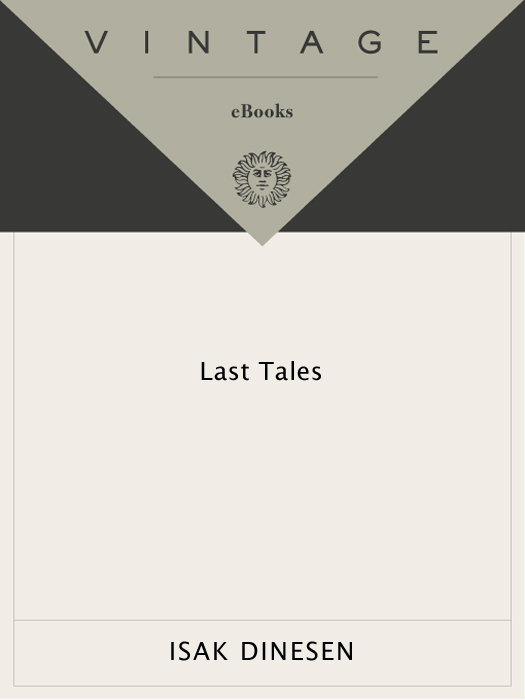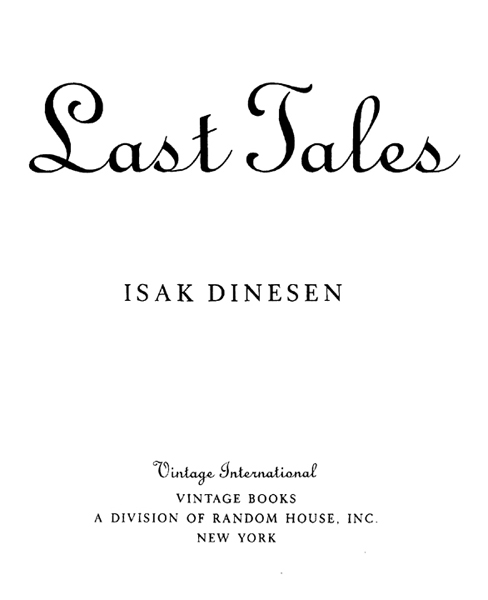ALSO BY Isak Dinesen
Anecdotes of Destiny
Babettes Feast and Other Anecdotes of Destiny
Ehrengard
Out of Africa
Seven Gothic Tales
Shadows on the Grass
Winters Tales

FIRST VINTAGE INTERNATIONAL EDITION, DECEMBER 1991
Copyright 1955, 1957 by Random House, Inc.
Copyright renewed 1983, 1985 by Tore Dinesen
All rights reserved under International and Pan-American Copyright Conventions.
Published in the United States by Vintage Books, a division of Random House,
Inc., New York, and simultaneously in Canada by Random House of Canada
Limited, Toronto. Originally published in hardcover by Random House, Inc.,
New York, in 1957.
Library of Congress Cataloging in Publication Data
Blixen, Karen, 1885-1962.
Last tales.
Translation of Sidste fortaellinger.
Reprint of the ed. published by Random House,
New York.
I. Title.
[PZ3.B62026Las7] [PT8175.B545] 839.8 1 372
91-50031
eISBN: 978-0-307-79074-3
v3.1
CONTENTS
Tales From Albonadocani
THE CARDINALS FIRST TALE
W ho are you? the lady in black asked Cardinal Salviati.
The Cardinal looked up, met the gaze of her wide-open eyes and smiled very gently.
Who am I? he repeated. Verily, Madame, you are the first of my penitents who has ever asked me that questionthe first, indeed, who has ever seemed to presume that I might have an identity of my own to confess to. I was not prepared for your question.
The lady remained standing up straight before him; without taking her eyes off his face, she mechanically pulled on her long gloves.
Men and women, the Cardinal went on, in the course of time have come to me and have asked my advice. Many of them have come in deep distress
As I myself! she exclaimed.
In deep distress and anguish, he continued, which, however, have never been deeper than my compassion with each of themand have put their problems before me in all kinds of terms. Madame, the multitude of statements and arguments have been but so many variations of one single cry of the heart, of one single question: Who am I? If I could but answer that question, if I could but solve that riddle for them, my consultants would be saved.
As I myself! she cried out for the third time. When I first told you of the horrible conflict, of the cruel dilemma which was rending my heart, I put before you, I know, a number of details, in themselves unconnected and contradictory, and so jarring that I had to stop the ears of my mind to them. In the course of our talks together all these fragments have been united into a whole. Oh, not into an idyllI am well aware that I am in for a furiosobut into a harmony without a discordant note to it. You have shown me myself! I might tell you that you had created me, and that I had come to life under your hands, and surely it would have been both happiness and pain to have been thus created. But it is not so; my happiness and my pain are greater still, for you have made me see that I was already createdaye, created by the Lord God Himself and issued from His hands. From this hour, what on earth or in heaven can harm me? To the eyes of the world, it is true, I am standing at the edge of an abyss, or walking in a blizzard in wild mountains, but the abyss and the blizzard are the work of God and are infinitely and magnificently beautiful!
She closed her eyes, then after a second looked up again.
Yet, she said, her voice soft, like the voice of a violin, I shall be asking one more favor from you. I beg you to answer my question. Who are you?
Madame, said the Cardinal after a long pause, I am not in the habit of talking about myself, and your demand makes me feel a little shy. But I do not want to see you go awayand maybe we two shall never meet againwithout having granted you your last request. And indeed, he added, I am beginning to take an interest in your question. Allow me, then, in order to save my modesty, to answer you in the classic manner, and to tell you a story.
Take a seat, Madame. The story may be somewhat intricate, and I myself may be a somewhat slow raconteur.
Without a word more the lady sat down in the big armchair indicated to her. The library in which the two found themselves was cool and high up; the noises of the street only reached the talker and the listener like the carefree murmur of a calm sea.
A girl of fifteen, the Cardinal began, with rich gifts of heart and mind, and magnificently innocent, was given away in marriage to a brusque and bigoted nobleman three times her age, who took a wife to have his name live on. A son was born to them, but the child was delicate and had but one eye. The doctors, who found a reason for the sad misfortune in the mothers young age, advised her husband to allow a few years to pass before the birth of another child. Not without some bitterness, the gentleman decided to follow their advice, and in his own mind fixed the period of waiting at three years. So as not to expose his inexperienced wife, during these three years, to the temptations of a worldly life, he took up residence in a palatial villa of his, overlooking beautiful, lonely mountain scenery, and engaged an old, impoverished but proud-hearted maiden aunt as dame de compagnie. And so as not to have the daily anxiety for a feeble, threatened being affect the Princess youthful vitality, he put his son out to nurse with a tenant family on another estate.
Possibly Prince Pompilio, who generally had firm faith in his own judgment, ought not this once to have yielded so easily to the old doctors opinion. His young wife had accepted her circumstances in life, her marriage and her husband, her palazzo and her coach, the admiration of a brilliant society, and in the end her frail little son, exactly as in former days she had accepted the dolls and the rosaries presented to her, the regulations of the convent school, and her own transformation from child into schoolgirl, and from schoolgirl into maiden. Even the separation from her child she had suffered in the same way, as the ordinance of higher powers. During her pregnancy, while she had been watched over and petted by all who surrounded her, she had come to see herself as a fragile, precious vessel, within which a rare seed had been laid down to germinate, and at the end of the term it had been her husbands old name to which she had given birth. Her personal share in the venture was now but the slightly aching echo of a faint little cry. In the course of the three years by the mountain-lake she learned to dream.
The villa contained a fine library. Here its master passed most of the time that he could spare from the administration of his property and the visits of prominent ecclesiastics. Upon the library shelves tall tomes, with their backs to the world, preserved the ponderous knowledge of ages. But from time to time during three centuries, volumes of more frivolous thoughts, of longing and levity and words that rhymed, had happened to leap in amongst them. On a day when her husband was away, the mistress of the villa found her way to the library. The large cool room, which till now had known only black and bleak human figures, became the abode of a fresh young being in white muslin, whose rich tresses, as she was reading, tumbled forward and caressed the parchment, and who seemed to be lifted from her chair by her own deep sighs of sadness or delight, and to be blown by them to and fro on the marble floor. It fell in love with her; it became a bower above a fountain nymph, shaking down on its own the sweet fruits that her heart demanded.










